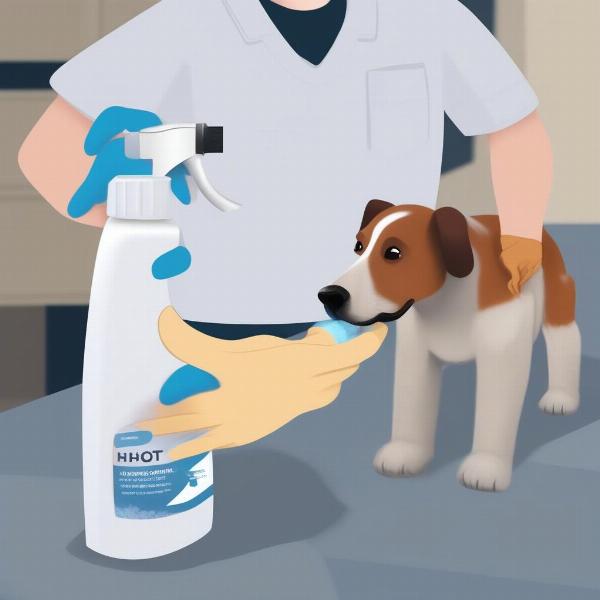Dog antiseptic sprays are a valuable tool in any pet owner’s arsenal, providing a convenient way to clean and disinfect minor wounds, hot spots, and skin irritations. Choosing the right antiseptic spray and using it correctly can help prevent infections and promote healing, keeping your canine companion happy and healthy. This guide will explore everything you need to know about antiseptic sprays for dogs, from understanding their uses to selecting the right product and applying it effectively.
Understanding the Uses of Dog Antiseptic Sprays
Antiseptic sprays offer a quick and easy method for treating minor skin issues in dogs. They are particularly useful for cleaning wounds, preventing infections in cuts and scrapes, and managing hot spots, those itchy, inflamed patches of skin that dogs can develop. While these sprays are effective for superficial issues, it’s crucial to remember they are not a replacement for veterinary care for serious injuries or deep wounds. Always consult your veterinarian if you are unsure about the severity of your dog’s condition. They can provide a proper diagnosis and recommend the best course of action.
Choosing the Right Antiseptic Spray for Your Dog
With a variety of antiseptic sprays available, selecting the right one for your dog can feel overwhelming. Look for sprays containing safe and effective ingredients such as chlorhexidine or povidone-iodine. Avoid products containing alcohol or tea tree oil, as these can be toxic to dogs. If your dog has sensitive skin, opt for a hypoallergenic formula. Furthermore, consider the spray’s application method. Some sprays come with a nozzle for targeted application, while others have a wider spray for larger areas.
Applying Dog Antiseptic Spray Correctly
Proper application of antiseptic spray is essential for its effectiveness. First, clean the affected area with warm water and a gentle cleanser. Pat the area dry before applying the spray, holding the bottle a few inches away from the skin.  Applying antiseptic spray to a dog's hotspot Apply a thin, even layer, avoiding oversaturation. Prevent your dog from licking the treated area for a few minutes to allow the spray to dry and work its magic. Repeat the application as directed by your veterinarian or the product instructions.
Applying antiseptic spray to a dog's hotspot Apply a thin, even layer, avoiding oversaturation. Prevent your dog from licking the treated area for a few minutes to allow the spray to dry and work its magic. Repeat the application as directed by your veterinarian or the product instructions.
When to Consult a Veterinarian
While antiseptic sprays are helpful for minor skin problems, certain situations warrant a visit to the vet. Deep wounds, punctures, or wounds that are excessively bleeding require professional attention. If you notice signs of infection, such as increased redness, swelling, pus, or a foul odor, contact your veterinarian immediately. Also, consult your vet if the skin issue doesn’t improve or worsens after a few days of using the antiseptic spray. They can determine the underlying cause and provide appropriate treatment.
Conclusion
Dog antiseptic sprays are a valuable addition to your pet care toolkit, offering a convenient and effective way to manage minor skin issues. Choosing a safe and effective product and applying it correctly are crucial for promoting healing and preventing infections. However, remember that these sprays are not a substitute for professional veterinary care when dealing with more serious injuries or infections. By understanding the proper use and limitations of dog antiseptic sprays, you can ensure your furry friend receives the best possible care.
FAQ
- Can I use human antiseptic spray on my dog? No, human antiseptic sprays often contain ingredients that are toxic to dogs. Always use a product specifically formulated for canine use.
- How often should I apply antiseptic spray to my dog? Follow the instructions on the product label or as directed by your veterinarian.
- What should I do if my dog licks the antiseptic spray? While a small amount is unlikely to cause serious harm, it’s best to prevent your dog from licking the treated area. If you are concerned, contact your veterinarian.
- Can antiseptic spray be used on open wounds? Yes, antiseptic sprays can be used on minor cuts and scrapes. However, deep wounds require veterinary attention.
- Are there any side effects of using dog antiseptic spray? Some dogs may experience mild skin irritation. If you notice any adverse reactions, discontinue use and consult your veterinarian.
- Where can I buy dog antiseptic spray? Dog antiseptic sprays are available at most pet stores, veterinary clinics, and online retailers.
- Can I use antiseptic spray along with other topical medications? Consult your veterinarian before using antiseptic spray in conjunction with other medications to avoid potential interactions.
ILM Dog is your trusted partner in providing the best possible care for your canine companion. We offer expert advice on all aspects of dog care, from breed selection and training to nutrition and grooming. Our website provides valuable resources on dog health and wellness, including articles on dog deodorant spray and chlorhexidine for dogs. We are committed to helping you keep your dog happy, healthy, and thriving. Contact us today at [email protected] or +44 20-3965-8624 for personalized advice from our expert team. ILM Dog is here for all your dog care needs. We also have informative articles on chlorhexidine dental rinse for dogs and tea tree oil hot spots for dogs.